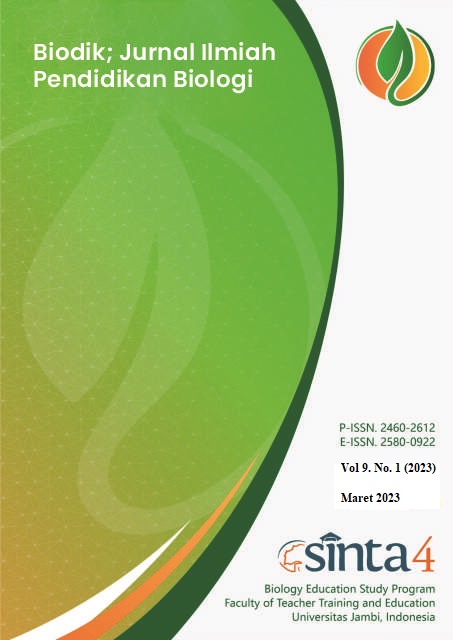Pemanfaatan Limbah Plastik Sebagai Media Pembelajaran Untuk Meningkatkan Hasil Belajar Siswa Kelas X SMA N 6 Madiun
(Utilization of Plastic Waste as Learning Media to Improve Student Learning Outcomes of Class X SMA N 6 Madiun)
DOI:
https://doi.org/10.22437/bio.v9i1.25065Abstract
The processing of waste and used goods has become vital in environmental conservation efforts. One of the efforts in waste processing is to carry out the recycling process to serve as learning media. The problem discussed in this study is regarding the development of learning media from waste (virus props) to improve student learning outcomes at SMA Negeri 6 Madiun. The research method used is this type of research in the form of application research using the One-Group Pretest-Posttest Design to compare the results of the pretest and post-test. The pretest stage is carried out when students have not been given treatment while the posttest stage is carried out when students have been given treatment. The implementation was carried out in two meetings with 71 class X students of SMA Negeri 6 Madiun. Based on the results of data analysis that has been carried out in research on pre-service PPG students at the University of PGRI Madiun, it was found that the variable Entrepreneurship Education, Self-Efficacy, has a positive and significant effect as the creation of learning media significantly increases the learning outcomes of class X students. This project activity is about how to manage and handling inorganic waste in the school environment, so that it can have an effective value. One of those values ​​is turning it into a learning medium that can assist teachers in providing more efficient learning to students.
Abstrak. Pengolahan sampah dan barang bekas telah menjadi hal yang vital dalam usaha pelestarian lingkungan. Salah satu upaya dalam pengolahan sampah adalah dengan melakukan proses daur ulang untuk dijadikan sebagai media pembelajaran. Permasalahan yang dibahas dalam penelitian ini yaitu mengenai pengembangan media pembelajaran dari sampah (alat peraga virus) untuk meningkatkan hasil belajar peserta didik SMA Negeri 6 Madiun. Metode penelitian yang digunakan adalah Jenis penelitian berupa penelitian penerapan menggunakan One-Group Pretest-Posttest Design untuk membandingkan hasil pretest dan post-test. Tahap pretest dilakukan saat peserta didik belum diberi perlakuan sedangkan tahap posttest dilakukan saat peserta didik telah diberi perlakuan. Pelaksanaan dilakukan sebanyak dua kali pertemuan pada 71 peserta didik kelas X SMA Negeri 6 Madiun. Berdasarkan hasil analisis data yang telah dilakukan dalam penelitian pada mahasiswa ppg prajabatan Universitas PGRI Madiun didapatkan hasil bahwa variable Pendidikan kewirausahaan, Efikasi diri, berpengaruh positif dan signifikan sebagai pembuatan media pembelajaran signifikan meningkatkan hasil belajar peserta didik kelas X. Kegiatan proyek ini adalah tentang bagaimana mengelola dan menangani sampah anorganik di lingkungan sekolah, sehingga bisa memiliki nilai efektif. Salah satu nilai itu adalah mengubahnya menjadi media pembelajaran yang dapat membantu guru dalam memberikan pembelajaran yang lebih efisien terhadap peserta didik.
Downloads
References
Akbar, S. (2013). Instrumen Perangkat Pembelajaran. Bandung: Remaja Rosdakarya.
Amir, M. F., & Wardana, M. D. K. (2017). Pengembangan Perangkat Pembelajaran Berbasis Masalah Kontekstual Untuk Meningkatkan Kemampuan Metakognisi Siswa Sekolah . Jurnal of Medies., 2(1), 117–128.
Bustami, Y., Syafruddin, D., & Afriani, R. (2018). The implementation of contextual learning to enhance biology students’ critical thinking skills. Jurnal Pendidikan IPA Indonesia, 7(4), 451–457.
Desimarlina, Y., Juniati, N., Ajizah, E., & Jamaluddin. (2021). Pemanfaatan Barang Bekas Sebagai Media Pembelajaran IPA Biologi pada Materi Virus di SMA Muhammadiyah Mataram. Jurnal Pengabdian Magister Pendidikan IPA, 4(2).
Gustina, Paramita, I., Untara, K. A. A., & Astuti, N. M. W. (2020). Pemanfaatan Sampah Anorganik sebagai Media Pembelajaran IPA Fisika pada Siswa SMA Negeri 1 Sigi. Jurnal Pendidikan Fisika Tadulako Online (JPFT), 8(3), 12–16.
Harahap, H. S. (2019). Pengembangan Media ajar interaktif biologi berbasis macromedia flash dalam komputer pada materi system pernapasan manusia. Jurnal Pembelajaran Dan Biologi Nukleus, 5(2), 54–66.
Muhlisin, A. (2019). Reading, mind mapping, and sharing (rms): innovation of new learning model on science lecture to improve understanding concepts. Journal for the Education of Gifted Young Scientists, 7(2), 323–340.
Muhlisin, A., Susilo, H., Amin, M., & Rohman, F. (2016). Improving critical thinking skills of college students through rms model for learning basic concepts in science. AsiaPacific Forum on Science Learning & Teaching, 1(7).
Sunarsih, L. E. (2018). Penanggulangan Limbah. Deepiblish, Yogyakarta.
Syafii, W., & Yasin, R. M. (2013). Problem solving skills and learning achievements through problem based module in teaching and learning biology in high school. Jurnal Asian Social Science, 2(9), 220–228.
Downloads
Published
How to Cite
Issue
Section
License
Copyright (c) 2022 Desi Lia Nur Rahmadani, Aza Ayunda Diamay, Dwi Anggoro, Bregas Dede Awalashari, Pujiati Pujiati

This work is licensed under a Creative Commons Attribution-NonCommercial-ShareAlike 4.0 International License.
Copyright Notice
Authors who publish with Biodik : Jurnal Ilmiah Pendidikan Biologi agree to the following terms:
- For all articles published in Biodik : Jurnal Ilmiah Pendidikan Biologi, copyright is retained by the authors and grant the journal right of first publication with the work simultaneously licensed under a Creative Commons Attribution-ShareAlike 4.0 International Licensethat allows others to share the work with an acknowledgment of the work's authorship and initial publication in this journal.
- Authors are able to enter into separate, additional contractual arrangements for the non-exclusive distribution of the journal's published version of the work (e.g., post it to an institutional repository or publish it in a book), with an acknowledgment of its initial publication in this journal.
- Authors are permitted and encouraged to post their work online (e.g., in institutional repositories or on their website) prior to and during the submission process, as it can lead to productive exchanges, as well as earlier and greater citation of published work (See The Effect of Open Access).
















